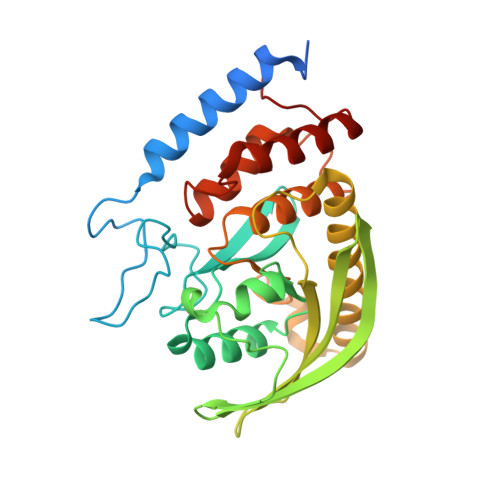Conservative Tryptophan Mutants of the Protein Tyrosine Phosphatase YopH Exhibit Impaired WPD-Loop Function and Crystallize with Divanadate Esters in Their Active Sites.
Moise, G., Gallup, N.M., Alexandrova, A.N., Hengge, A.C., Johnson, S.J.(2015) Biochemistry 54: 6490-6500
- PubMed: 26445170
- DOI: https://doi.org/10.1021/acs.biochem.5b00496
- Primary Citation of Related Structures:
4YAA, 4Z6B, 4ZI4, 4ZN5 - PubMed Abstract:
Catalysis in protein tyrosine phosphatases (PTPs) involves movement of a protein loop called the WPD loop that brings a conserved aspartic acid into the active site to function as a general acid. Mutation of the tryptophan in the WPD loop of the PTP YopH to any other residue with a planar, aromatic side chain (phenylalanine, tyrosine, or histidine) disables general acid catalysis. Crystal structures reveal these conservative mutations leave this critical loop in a catalytically unproductive, quasi-open position. Although the loop positions in crystal structures are similar for all three conservative mutants, the reasons inhibiting normal loop closure differ for each mutant. In the W354F and W354Y mutants, steric clashes result from six-membered rings occupying the position of the five-membered ring of the native indole side chain. The histidine mutant dysfunction results from new hydrogen bonds stabilizing the unproductive position. The results demonstrate how even modest modifications can disrupt catalytically important protein dynamics. Crystallization of all the catalytically compromised mutants in the presence of vanadate gave rise to vanadate dimers at the active site. In W354Y and W354H, a divanadate ester with glycerol is observed. Such species have precedence in solution and are known from the small molecule crystal database. Such species have not been observed in the active site of a phosphatase, as a functional phosphatase would rapidly catalyze their decomposition. The compromised functionality of the mutants allows the trapping of species that undoubtedly form in solution and are capable of binding at the active sites of PTPs, and, presumably, other phosphatases. In addition to monomeric vanadate, such higher-order vanadium-based molecules are likely involved in the interaction of vanadate with PTPs in solution.
Organizational Affiliation:
Department of Chemistry and Biochemistry, Utah State University , Logan, Utah 84322-0300, United States.
















